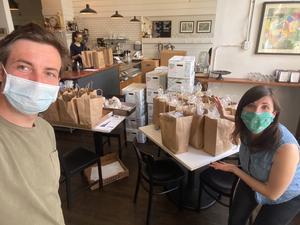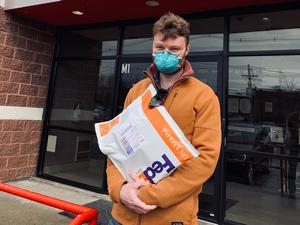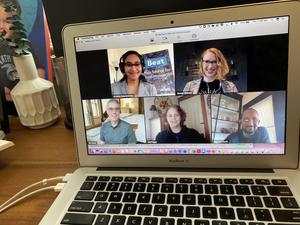Innovation is so frequently born in a crucible.
Our present moment—one marked by a disease that has upended every aspect of modern life, highlighted social and economic inequities past the point of ignoring them and put national and local government responses in a harsh new light—is a crucible that only comes around once in a lifetime.
BostInno readers, you already know that Boston is a hub of innovation. We are home to many of America's best research institutions and most groundbreaking life sciences firms. Our startup ecosystem has helped launch the careers of entrepreneurs in biotech, food, social impact enterprises and more. Now, those same entrepreneurs are putting energy back into the community, stepping up to help us out of this pandemic in myriad ways.
We've selected a handful of organizations that are fighting to mitigate the spinout effects of the coronavirus pandemic. In several cases, they're even fighting the coronavirus itself.
These are our Crisis Innovators.
Moderna Therapeutics
We'd be remiss if we didn't highlight the Cambridge biotech that is actually developing a promising vaccine against the coronavirus, one that U.S. National Institute of Allergy and Infectious Diseases Director Anthony Fauci singled out as a reason for optimism in May. Moderna's coronavirus vaccine candidate is one of the most advanced in the U.S.: It's currently in Phase 3 clinical trials, which will ultimately test the vaccine in 30,000 volunteers. If all goes well, CEO Stephane Bancel expects the vaccine will be commercially available in the U.S. in 2021. The company inked a deal with the U.S. government this month to sell 100 million doses of the vaccine for a grand total of $1.525 billion.
Moderna was founded in 2010 out of Cambridge life sciences firm Flagship Pioneering. It develops therapeutics and vaccines using messenger RNA, or mRNA, which also serves as the basis of its coronavirus vaccine candidate. Moderna received $483 million in funding from the Biomedical Advanced Research and Development Authority (BARDA) this year for the critical project.
GreenLight Biosciences
Medford-based GreenLight Biosciences embarked on a big pivot this year. The company got its start by developing a pesticide alternative: an RNA-based product that targets harmful pests by modifying their gene expressions and weakening them through a natural process. Now, it's taking the basis of that technology—targeting pests using RNA, thereby leaving the environment around them undisturbed—and applying it to life sciences.
GreenLight is currently developing a large-scale vaccine platform targeting seasonal and pandemic influenza, as well as rapid response to emerging viruses. The startup has several coronavirus vaccine candidates in the works, all mRNA-based. But GreenLight isn't stopping with its own vaccines. It can also use its platform to scale the development of "nearly any other mRNA vaccine candidate as well," a spokesman told BostInno in May, which would include Moderna's.
GreenLight raised an oversubscribed $17 million special purpose funding round this spring through a wholly-owned subsidiary called GreenLight Pandemic Response. In June, it added another $102 million to its coffers in an oversubscribed Series D round to develop its RNA platform overall.
Biobot Analytics
MIT spinoff Biobot Analytics, a Somerville-based biotech startup specializing in wastewater epidemiology, started testing for SARS-CoV-2 in wastewater this spring. The technique has since proved to be a critical tool in tracking the prevalence of coronavirus in communities as the U.S. continues to lag in testing.
"We are designed to respond to whatever is a public health priority at the moment," co-founder Newsha Ghaeli told BostInno in April. "If this disease ends up being seasonal or if we see other surges, then this [data] can be an early warning."
In March, Biobot Analytics—in collaboration with MIT, Harvard University and Brigham and Women's Hospital—tested wastewater at a major urban facility in Massachusetts and found that the number of coronavirus cases were likely "an order of magnitude higher" than the number of recorded cases in the state. Today, Biobot is working with about 400 facilities in 42 states across the U.S., which represents more than 10 percent of the U.S. population, a spokesperson wrote in an email to BostInno.
Locally, the startup is working with the City of Cambridge and the Massachusetts Water Resources Authority to analyze wastewater for the presence of SARS-CoV-2, which Cambridge will use as one of three key metrics to determine whether it's safe to reopen schools.
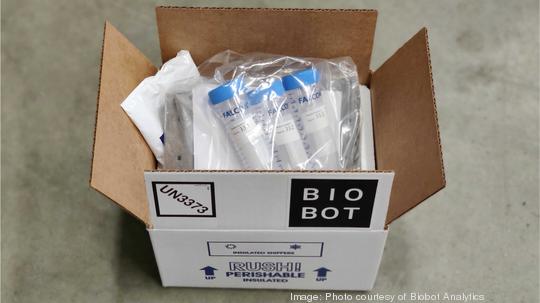
Ginkgo Bioworks
Central to any national plan to get America out of this pandemic safely: testing, testing, testing. With the help of a $40 million contract from the National Institutes of Health (NIH), 11-year-old life sciences startup Ginkgo Bioworks is working to scale its automated technology for SARS-CoV-2 testing using next-generation sequencing.
Ginkgo already has sequencing machines—its "Illumina" machines—that can read thousands of coronavirus test samples simultaneously. Now, Ginkgo is building out a fully automated factory in Boston, centered on Illumina machines, which the company told The Atlantic this month could test about 250,000 samples a day. It aims to open the facility by mid-October. By year's end, it could build out another three facilities, allowing Ginkgo to test 1 million samples each day, The Atlantic reported.
The NIH isn't the only one funding this effort. Ginkgo took on a $70 million investment back in May from Illumina, General Atlantic and Viking Global Investors to start work on the test-reading facilities.
"Our goal is to process at least half a million tests per day in our lab by the end of the year," chief commercial officer Matt McKnight said in a June press release. "Building a testing program of this size, speed and throughput is a massive undertaking, critical not just for the Covid-19 response but for our ability to be better prepared for future health crises."
E25Bio
Another local startup working on rapid testing is Cambridge-based E25Bio. E25Bio has created cheap, paper tests that need only spit, a saline solution and a small cup to work, and each test can deliver a result in 15 minutes, The Atlantic reported. E25Bio's team believes the startup could make 4 million tests a month as soon as it receives FDA approval. Within six weeks of approval, it could make 20 million to 40 million tests a month. (E25Bio has not responded to BostInno's requests for comment about the FDA approval timeline.)
This month, E25Bio got a boost to its test development in the form of two grants: $4.14 million from the Bill & Melinda Gates Foundation and $1.68 million from the NIH’s Small Business Innovation Research (SBIR) program. The former is earmarked for research and development on E25Bio's coronavirus test; it will also help the startup's scientists generate a coronavirus monoclonal antibody repository for future diagnostic efforts and develop a mobile app to track and map disease data.
BRIO Systems
This spring, three-year-old BRIO Systems' mission suddenly changed. Instead of using its disease testing platform for biomarkers of chronic illnesses, BRIO decided to focus its efforts completely on using that platform to test for coronavirus. BRIO has since used its network of laboratory and nursing partners to set up onsite coronavirus testing at workplaces in some of the hardest-hit states in the country, including Florida, California and Georgia. The startup also recently partnered with North Carolina firm BioAgilytix Labs on a nationwide workforce testing program.
"We offer a complete solution, A to Z," said CEO and co-founder Boris Lipchin. "You don't need to call anyone else. We’re very humbled by the fact that people trust us with this responsibility. That’s been a huge journey for us."
BRIO closed its seed round this month to help gets its workplace testing efforts off the ground: $1.9 million led by One Way Ventures, a Boston-based seed-stage fund for immigrant tech founders.
Grocery Outpost
Responding to the pandemic isn't all about life sciences. It's also about helping the people and businesses who were sideswept by our new reality. In April, out-of-work entrepreneurs Emma Snyder and Ethan Pierce teamed up to launch Grocery Outpost to help shut-down restaurants and their wholesalers find new streams of revenue. The startup allows restaurants to get set up as temporary grocery stores: Customers can order food products from restaurant wholesalers via Grocery Outpost's online platform, and the food is delivered via the restaurants themselves.
Since launching, Grocery Outpost has expanded to 10 restaurant "outposts" and onboarded several new wholesale vendors to service more than 500 households in Greater Boston, Pierce said. The team has also grown to three: Snyder and Pierce were able to hire an account manager this summer. Originally conceived of as a pandemic project, Grocery Outpost is now looking to become a fully fledged business. Pierce said he and Snyder have taken on outside investment to help them get to their next goal of bringing on 50 restaurants.
"It’s still very much a labor of love in so many ways," Pierce said. "We’re really hopeful. Social entrepreneurship is really important to me. Small business is really important to me. So many tech companies succeed on the backs or at the expanse of small businesses and workers. It’s really energizing for me to be working for a company that is actually helping to make small businesses more viable."
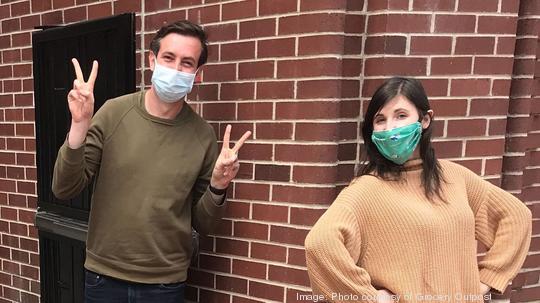
In September, Grocery Outpost will launch a membership program, which Snyder jokingly calls "the Costco of local." Members will pay a fee to get access to a catalog of products available at their local outpost.
Commonwealth Kitchen
The nonprofit food business incubator has stepped up to a critical mission: feeding people. In May, Commonwealth Kitchen teamed up with the City of Boston on an initiative called CommonTable, which provided free meals to needy families and seniors. It was funded by a $461,688 grant from the Boston Resiliency Fund, which the city created to serve the community amid the pandemic.
Commonwealth Kitchen executive director Jen Faigel estimates that between April and the end of July, CommonTable prepared and delivered about 85,000 meals to people in Boston, Chelsea and Revere, working with its member restaurants and partner organizations. Although that funding has since run out, Faigel and her team are pivoting toward several new initiatives, starting with one in partnership with the Boston Housing Authority (BHA) that launched last week. Using funding from the U.S. Department of Housing and Urban Development, the BHA has engaged Commonwealth Kitchen to provide meals to people in its buildings. Commonwealth Kitchen is working with Black-owned catering company City Fresh Foods and several local farmers on that project.
"We're still in that crazy world of, how can we be part of solutions in the short term?" Faigel said. "Our team is always like, 'We have a mission that's about our members. We're trying to build a new food economy grounded in racial, social and economic justice. What does that look like? Therefore, what are the pivots we need to take?'"
